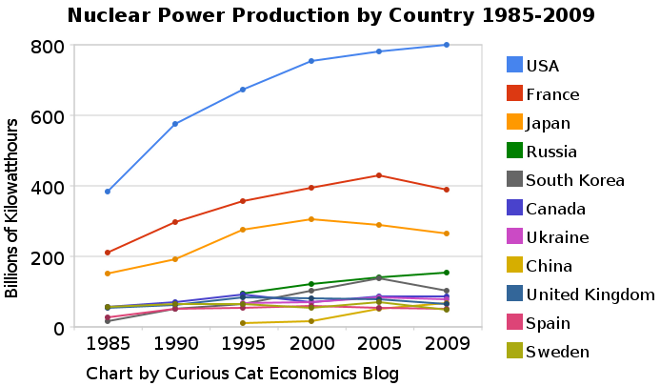amit wrote:Meanwhile, despite "tons of radioactive waste poured into the sea" at Fukushima 15 months after what do the Japanese do?
<snip>
These Japanese folks must be nuts I tell you. They should be reading the Nuke Dhaga here first before eating their sushi and shasami.
Seriously, after about an year after Fukushima, we have huge amount of data about health effects. This is combined with other data (including TMI, Chernobyl and labs). Recently there have been many scholarly article about health effects, specially for low level radiation. A few are recommending to take a re-look at evacuation criteria.
Earlier I posted, for example, this MIT study (
Link - Please do read it if you have not
where they found NO detectable DNA Damage in Mice after Continuous Irradiation at ~400-fold Natural Background Radiation!
Now, for your handy use, I am x-posting an article from physics dhaga, because it is very relevant and thought provoking here The article was published in Forbes a few months ago, and generated many comments. The author's response to those comments is also worth reading (the link of that is in the link given below)..
The author is a Caltech PhD.
It contains no reference to banana..

(but it does talk about potato chips..

)
(Edited later, there is just one reference to banana)
Fukushima's Refugees Are Victims Of Irrational Fear, Not Radiation
Every time I eat a bag of potato chips I think of Fukushima. This 12-ounce bag of chips has 3500 picoCuries of gamma radiation in it, and the number of bags I eat a year gives me a dose as high as what I would receive living in much of the evacuated zones around Fukushima. But unlike the Fukushima refugees, I get to stay in my home. We live in a nuanced world of degree. Eating a scoop of ice cream is fine, eating a gallon at one time is bad. Jumping off a chair is no big deal; jumping off a cliff is really stupid. The numbers matter. It’s the dose that makes the poison. There is a threshold to everything.
The radiation in those potato chips isn’t going to kill me. Likewise, no one is going to die from Fukushima radiation. Cancer rates are not going to increase in Japan. The disaster wasn’t hidden like the Soviets did, so that people unknowingly ate iodine-131 for two months before it decayed away to nothing. No one threw workers into the fire like lemmings because they didn’t know what to do.
Where do I get off downplaying the effects of the Fukushima disaster? I’ve been studying the environmental effects of radioactive contamination for three decades, working at America’s national labs and nuclear waste repositories. My enduring frustration: the extreme supposition that all radiation is deadly and that there is no dose below which harmful effects will not occur.
This idea, known as the Linear No-Threshold Dose hypothesis (LNT), was adopted in 1959 as the global regulating philosophy and remains entrenched against all scientific evidence. It is an ethical nightmare. And it will destroy Japan’s economy.
It‘s keeping 100,000 Japanese citizens as refugees, as it did almost a million Ukrainians. It will waste $100 billion that’s needed to rebuild the devastation from the tsunami, not protect against a large intake of potato chips. It will cause more injury to Japan’s already beleaguered population and damaged economy, for no benefit.
We set thresholds to protect people against harm, and we’ve done a good job. The Clean Water Act, the Clean Air Act, seat belts, coal flue scrubbers, all have saved millions of lives and made the quality of life better for everyone. But thresholds need to be set with reason. We don’t stop driving just because 50,000 people still die on the roadways each year, or stop heating our homes because 1,000 people die every month from coal particle inhalation. We try to make it safer and we deal with things as they occur.
For radiation this philosophy has failed. The LNT theory has been long since disproven.
<snip>
As a scientist, this is disturbing. Fukushima’s a mess but it’s an economic mess, not a fatal one. There are areas around Fukushima that need to be cleaned up and they will, with technologies we’ve developed just for this purpose. In this new global economy, Japan’s response will not only affect Japan. Amid the Fukushima hysteria Germany has decided to shut down its nuclear reactors and import more natural gas from Putin and more nuclear energy from France and the Czechs. This does not make sense, either economically, politically or with respect to safety. If Germans or Japanese are that worried about radiation then a more sensible course of action would be to stop eating potato chips, beets, brazil nuts and bananas, all of which are relatively high but ultimately harmless sources of radiation.
Japan shouldn’t sacrifice the lives of the 63,000 evacuees from Fukushima Province to this ideology. ..
<snip - please read the original link>
.
The followup (response to many comments) is at:
here
..Seriously? LNT is not established science, it’s established policy. Ideology and policy are not science. I love Google and Wikipedia, but they don’t take the place of actual research. You need to go back and read the primary documents, review the actual data, read Hermann Mueller’s letters from 1946 and why he chose to ignore certain studies, understand the math of risk analysis, understand the Cold War environment under which LNT was adopted. The job of science is to understand. The job of ideology is to coerce. The people of Japan are not being hysterical, they’re being afraid because we told them to be. Without caring about the consequences. We know better, but sound bites don’t capture the subtleties of this problem..
<snip>.

